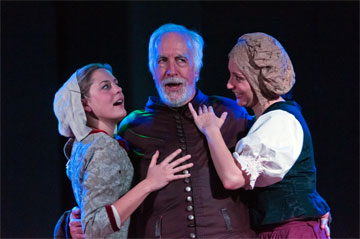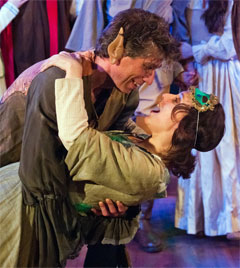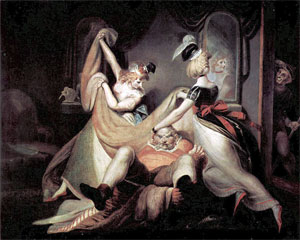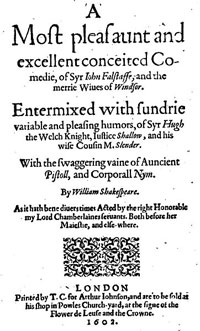Play
by William Shakespeare
Actors’ Shakespeare Project
Davis Square Theatre
Somerville, MA
Directed by Steven Barkhimer
Scenic Designer: Jenna McFarland-Lord, Costume Designer: Rebecca Butler, Lighting Designer: Kenneth Helvig, Sound Designer: Adam Howarth, Choreographer: Susan Dibble, Music Director: Bill Barclay, Vocal Coach: Karen Kopryanski, Sgae Manager: Adele Nadine Traub, Production Manager: Jason Ries
With Esme Allen (Mistress Page, Pistol), Bill Barclay (Slender, Fenton), Lydia Barnett-Mulligan (Anne Page, Bardolph, Dr. Caius, Robin), Marianna Bassham (Mistress Ford, Nym), Ruby Rose Fox (Mistress Quickly, Shallow), John Greene (Master Page, Host of the Garter), Gabriel Kuttner (Hugh Evas, Rugby), Richard Snee (Sir John Falstaff), Michael Forden Walker (Master Ford, Simple)
December 7, 2011 – January 1, 2012

and Marianna Bassham as Mistress Ford
Photo:Stratton McCrady,
courtesy of Actors' Shakespeare Project
Sir John Falstaff is in need of money and connives to seduce two wealthy, but married, women to get some help. Soon the two women – Mistresses Ford and Page – discover the ruse and go on the offensive in return, constructing a plot by which Falstaff will be hoisted by his own petard.
Jealous, Master Ford, in disguise, gets into the act with Falstaff, adding another dimension to the intrigue. Meanwhile, the Pages’ daughter, Anne, wants to marry a penniless fellow named Fenton, while her parents each want her to marry someone different. Machinations abound, and, in the end, Falstaff gets his comeuppance and true love is rewarded.

Photo:Stratton McCrady,
courtesy of Actors' Shakespeare Project
Merry Wives is heavy on farce and there is enough going on in this plot to keep one well confused for quite awhile. The greatest Shakespearean comedies (ASP just finished a wonderful production of Twelfth Night) integrate the farcical material with other, more subtly emotional, elements in a way that it seasons rather than dominates the plot.
In the lesser comedies like The Comedy of Errors or The Merry Wives of Windsor, the farce can easily become so dominant that it is like having all seasoning and no substance. This makes these more explicit farces, in some ways, more challenging than the subtler comedies to produce effectively.
Here, at the outset, the production allowed the farce to dominate; and due to its frenetic energy, I found the first act confusing. But, in the second act, when the pace settled down and the players could stretch out and do their thing, the story became much clearer, and its feeling emerged.
Marianna Bassham, who plays Mistress Ford, is a long-time member of the ASP company, and a very talented, and when called for, very funny, actress. This play gives her a real opportunity to play a role broadly, which she does with extreme gusto.
Her counterpart, Michael Forden Walker, another long-time ASP actor, is also extremely versatile and competent and together they make a wonderful pair. Both actors are able to ham it up with the best of them, but when the time comes to bring out the poignant notes, they are right there with them, and great together.
Esme Allen as Mistress Page is perfectly delightful and adds a sparkling energy to the production.
Bill Barclay as Fenton and Slender does a great job of playing off Anne Page’s doofus suitor and the noble but impecunious one. The two characters travel close behind one another, but Barclay adeptly and convincingly keeps them clear and distinct.
Though perfectly competent, Richard Snee comes across as a bit too streamlined for Falstaff. He conveys a kind of elegant grace which, here especially, is antithetical to Falstaff’s character. One really needs to grovel in the pits of manipulative dissolution to bring out a reasonably pitiful Falstaff. The Falstaff of Merry Wives is a less nuanced character than the Falstaff of Henry IV, but, even so, it is reasonable to expect the character to embody the kind of despicably laughable subversiveness that it deserves.

by Johann Heinrich Fussli
The show started and ended with brilliantly conceived musical numbers performed by the entire company. The musical direction was by Bill Barclay (who also plays Fenton and Slender); Steven Barkhimer, the director, is also a superb musician who did wonderful arrangements for Twelfth Night. These numbers were so good, I wished there had been a few more throughout.
The Davis Square site of Jimmy Tingle’s old theater is the setting for this production and it suits the production well, giving the sense of intimacy that is the Actors’ Shakespeare Project’s stock in trade.
– BADMan

Leave a Reply